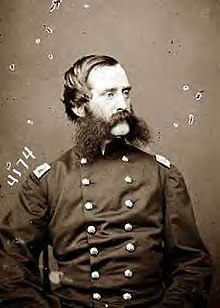Elisha Marshall | |
|---|---|
 | |
| Birth name | Elisha Gaylord Marshall |
| Born | January 26, 1829 Seneca Falls, New York, U.S. |
| Died | January 26, 1883 (aged 54) Canandaigua, New York, U.S. |
| Buried | Mount Hope Cemetery |
| Allegiance | |
| Service/ | Union Army |
| Rank | Brigadier general |
| Commands held | 13th New York Volunteer Infantry |
| Battles/wars | American Civil War |
Elisha Gaylord Marshall (January 26, 1829 -– August 3, 1883) was a brevet brigadier general of the Union Army in the American Civil War.
Life and career
Born in Seneca Falls, New York on January 26, 1829, Marshall graduated from West Point in 1850.[1][2] He served in the Utah War as a first lieutenant. He also fought in the Battle of the Colorado River in 1859 during the Mohave War in Arizona.[3]
He was promoted to captain in May 1861, and became a colonel of volunteers in April 1862. He was seriously wounded while leading the 13th New York Volunteer Infantry in the Battle of Fredericksburg, and did not return to active duty until early 1864. He was captured in the Battle of the Crater, and was held as a prisoner of war until April 1865.[4][5]
Marshall received brevet promotions to brigadier general of volunteers in December 1862, to recognize his service at Fredericksburg, and of the regular army in March 1865 to recognize his service throughout the war.[6][7]
Following the war, he was reduced in rank to major, and served in the Army until retiring with the permanent rank of colonel in September 1867.[8]
His first wife was Hannah Viola Ericsson (1844–1873). They had two children, Nora (1861–1865) and Aaron (1872–1873). In 1875 Marshall married Janet Rutherford. They later separated, and Mrs. Marshall lived at Marshall Hill, a fourteen-room mansion the Marshalls built on a red shale hill near the Lehigh River and Blue Mountain in Palmerton, Pennsylvania.[9][10] Janet Rutherford Marshall died in 1911, and her estate was appraised at more than one million dollars, equivalent to about $24 million in 2013.[11]
He died Canandaigua, New York on January 26, 1883.,[12] and was buried with his first wife in Rochester's Mount Hope Cemetery.[13][14]
In June 2000 Marshall's grave was broken into, his skull was stolen, and his remains were scattered around his grave. The perpetrators were not caught, and Marshall's remains, minus the skull, were reinterred.[15][16][17]
References
- ↑ John F. Schmutz, The Battle of the Crater: A Complete History, 2009, page 139
- ↑ George Ward Kemp, Andrew Warde and his Descendants, 1597-1910, 1910, page 311
- ↑ Rossiter Johnson, John Howard Brown, The Twentieth Century Biographical Dictionary of Notable Americans, 1904, pages 1877 to 1878
- ↑ Kevin M. Levin, Remembering the Battle of the Crater: War As Murder, 2012, page 15
- ↑ John Cannan, Crater: Burnside's Assault on the Confederate Trenches July 30, 1864, 2002, page 149
- ↑ Francis Bernard Heitman, Historical Register and Dictionary of the United States Army, Volume 1, 1903, page 690
- ↑ George Washington Cullum, Edward Singleton Holden, Biographical Register of the Officers and Graduates of the U.S. Military Academy at West Point, Volume II, 1891, pages 426 to 427
- ↑ Eveline Martin Alexander, Sandra L. Myres, Cavalry Wife: The Diary of Eveline M. Alexander, 1866-1867, 1988, page 131
- ↑ Matt Michael, Lehigh Valley Morning Call, Haunted House' Near Palmerton Goes From Eerie To Cheery, August 23, 1987
- ↑ Frank Whelan, Allentown Morning Call, Lower Towamensing House History Tied to Civil War: Elisha G. Marshall, a Union General, Called it Home in the 1880s, December 28, 2005
- ↑ New York Times, Mrs. E. . Marshall's Estate, November 30, 1912
- ↑ New York Times, Obituary, Elisha G. Marshall, August 4, 1883
- ↑ Thomas William Herringshaw, Herringshaw's National Library of American Biography, Volume IV, 1914, page 44
- ↑ Richard O. Reisem, Mount Hope, Rochester, New York: America's First Municipal Victorian Cemetery, 1995, page 15
- ↑ Katherine Ramsland, Cemetery Stories, 2011, page 189
- ↑ Shirley Cox Husted, Ruth Rosenberg-Naparsteck, Rochester Neighborhoods, 2000, page 96
- ↑ Associated Press, Pomeroy, Ohio Times-Sentinel, General's Skull Taken From Grave, June 18, 2000